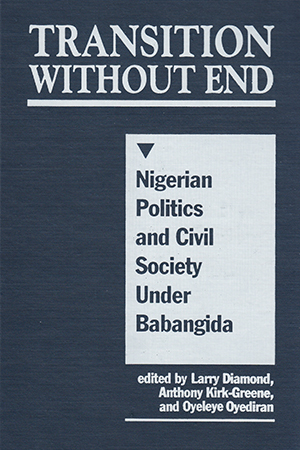Since 1986, Nigeria has been struggling without success to return to a civilian, democratic form of government: as political parties, presidential candidates, economic reform programs, and top military officers have come and gone, the country has become mired in an authoritarian limbo, a transition without end. This wide-ranging study examines the rise and fall of democratic transition and structural adjustment in Nigeria during the eight-year regime of General Ibrahim Babangida (1985-1993), chronicling the descent from the promise of reform and renewal to an unprecedented political and economic depression.
While showing the vibrancy of Nigeria's democratic aspirations and civil society, the authors document the political and social fragmentation, corruption, cynicism, and repression that undermined Babangida's transition program and brought its collapse in 1993. Providing both historical narrative and political analysis, they offer the most comprehensive treatment to date of Nigeria's failed transition.
Larry Diamond is senior research fellow at the Hoover Institution and editor of the Journal of Democracy. His numerous publications include Class, Ethnicity, and Democracy in Nigeria, Promoting Democracy in the 1990s, and (coedited with Juan Linz and Seymour Martin Lipset) Democracy in Developing Countries. Anthony Kirk-Greene is senior research fellow in African studies at St. Anthony's College, University of Oxford. Among his major books are Crisis and Conflict in Nigeria, The Transfer of Power in Africa: The Colonial Administrator in the Age of Decolonization, and (with Douglas Rimmer) Nigeria Since 1970: A Political and Economic Outline. Oyeleye Oyediran is professor of political science at the University of Lagos, Nigeria. He is editor of Nigerian Government and Politics Under Military Rule, 1966-1979 and Survey of Nigerian Affairs, 1973-1977 and 1978-1979.
No rights in Nigeria"Whatever happens in Nigeria, this book presents compelling evidence for why Nigeria's military is congenitally unwilling to preside over basic reforms in Nigerian politics.... The analyses and warnings of the contributors apply beyond the Babangida era that is their focus."—William Reno, African Studies Review
"Transition Without End belongs on the shelves of all serious students of African politics."—Claude E. Welch, Jr., Journal of Developing Areas
"With the precision of the surgeon, the authors chronicle, dissect and critically examine the amazing twists and turns in the political, social and economic life of Nigeria in the turbulent years between 1985 and 1993.... The book is a must for Nigerianists and Africanists."—Africa World Review
"Ably edited and assembled, this collection of empirically detailed, high quality essays provide a comprehensive look at the politics of the regime of General Ibrahim Babangida, Abacha's most immediate military predecessor. Readers are thus provided the background information and analysis necessary to understand the current installment of Nigeria's seemingly endless transition to civilian rule. A striking and most welcome aspect of this collection is that the vast majority of the contributors are Nigerian social scientists. Specialists on Nigeria as well as others with an interest in the current wave of democratization will find this a rewarding volume."—Michael G. Schatzberg, The Ethnic Conflict Research Digest








